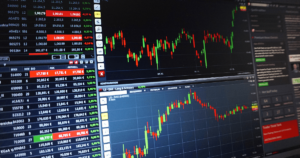Introduction
MetaTrader is a widely used trading platform in the financial industry, offering traders a range of features and tools to execute trades in various financial markets. In this comprehensive guide, we will delve deeper into the pros and cons of MetaTrader, exploring its history, functionalities, and key advantages and disadvantages. Whether you are a beginner or an experienced trader, understanding the benefits and limitations of the MetaTrader platform can help you make informed decisions about your trading strategy.
The History of MetaTrader MT4 and MT5
MetaTrader 4 (MT4) was first introduced in 2005 by MetaQuotes Software and quickly gained popularity among retail forex traders. It revolutionized the industry by providing advanced tools and functionality that were previously available only to professional traders. MT4 became the go-to platform for many traders, and its loyal fan base remains strong to this day.
In 2010, MetaTrader 5 (MT5) was released as an upgraded version of MT4. While MT4 primarily focused on forex trading, MT5 expanded its scope to include multiple asset classes such as stocks, commodities, indices, and futures. MT5 also introduced additional features and indicators, making it a more comprehensive platform for traders.
Pros of MetaTrader
1. Wide Availability and Compatibility
One of the major advantages of MetaTrader is its widespread availability among brokers. Almost every broker in the industry offers MetaTrader as a trading platform option, ensuring that traders have access to this powerful tool. Additionally, MetaTrader is compatible with various operating systems, including Windows, macOS, and mobile platforms, making it accessible for traders on different devices.
2. User-Friendly Interface
MetaTrader provides a user-friendly interface that caters to traders of all experience levels. The platform offers intuitive navigation, customizable charts, and a wide range of technical indicators and analysis tools. This ease of use makes it suitable for beginners who are just starting their trading journey.
3. Automated Trading Capabilities
MetaTrader platforms are renowned for their automated trading capabilities. The MetaQuotes Language (MQL) allows traders to develop and implement Expert Advisors (EAs), which are automated trading systems. Traders can create their own EAs or choose from a vast library of pre-existing EAs developed by the MetaTrader community. The ability to automate trading strategies can save time and help traders take advantage of market opportunities even when they are not actively monitoring the markets.
4. Extensive Backtesting and Strategy Optimization
MetaTrader platforms offer robust backtesting and strategy optimization tools. Traders can test their trading strategies using historical data to assess their performance and make necessary adjustments. This feature allows traders to refine their strategies before deploying them in live trading, increasing the likelihood of success.
5. Vast Community Support
The MetaTrader community is vast and active, comprising traders, developers, and enthusiasts. Traders can access online forums, social trading networks, and educational resources to seek advice, share ideas, and gain insights from experienced traders. The community aspect of MetaTrader fosters a collaborative environment and provides a valuable support system for traders.
Cons of MetaTrader
1. Limited Depth of Market (DOM) Data
One limitation of MetaTrader is its limited Depth of Market (DOM) data. DOM provides traders with information about the current buy and sell orders in the market, helping them gauge market liquidity and potential price movements. While MetaTrader displays some level of DOM data, it may not be as comprehensive as what is available on other advanced trading platforms.
2. Steep Learning Curve for Advanced Features
While MetaTrader is user-friendly for basic trading functions, mastering its advanced features and customization options can be challenging for novice traders. Utilizing complex functionalities like building custom indicators or EAs may require programming knowledge or the assistance of experienced developers.
3. Inadequate Risk Management Tools
MetaTrader platforms offer essential risk management tools such as stop-loss orders and take-profit orders. However, some traders may find these tools to be limited in terms of flexibility and customization. Advanced risk management techniques, such as trailing stops or conditional orders, may not be available in the default MetaTrader setup.
4. Lack of Integrated Fundamental Data
MetaTrader platforms primarily focus on technical analysis and provide a wide range of technical indicators. However, they may lack integrated access to comprehensive fundamental data, such as economic news releases, earnings reports, or company-specific data. Traders who heavily rely on fundamental analysis may need to supplement their MetaTrader platform with additional tools or data sources.
Common Queries about MetaTrader
1. Is MetaTrader free to use?
Yes, MetaTrader is free to use. Brokers provide the MetaTrader platform to their clients at no cost. However, it’s important to note that while the platform itself is free, traders may incur fees related to trading, such as spreads, commissions, or data subscriptions.
2. Can I use MetaTrader to trade cryptocurrencies?
Yes, MetaTrader platforms support cryptocurrency trading. With the increasing popularity of cryptocurrencies, many brokers have integrated cryptocurrency trading capabilities into their MetaTrader offerings. Traders can access a wide range of cryptocurrencies, including Bitcoin, Ethereum, Litecoin, and more, and trade them using MetaTrader’s familiar interface and tools.
3. Can I trade on MetaTrader from my mobile device?
Yes, MetaTrader provides mobile applications for both iOS and Android devices. These mobile apps offer full functionality, allowing traders to access their accounts, monitor the markets, place trades, and manage their positions from anywhere with an internet connection. Mobile trading on MetaTrader offers convenience and flexibility for traders on the go.
4. Can I use MetaTrader with a demo account?
Yes, MetaTrader platforms offer demo accounts that allow traders to practice trading strategies and explore the platform’s features without risking real money. Demo accounts provide a simulated trading environment with virtual funds, enabling traders to gain familiarity with MetaTrader before engaging in live trading.
Key Takeaways
- MetaTrader is a popular trading platform widely used by traders in various financial markets.
- MetaTrader 4 (MT4) and MetaTrader 5 (MT5) are the main versions, with MT5 offering additional functionalities and multi-asset trading capabilities.
- The pros of MetaTrader include its wide availability, user-friendly interface, automated trading capabilities, extensive backtesting, and a supportive community.
- The cons of MetaTrader include limited Depth of Market (DOM) data, a learning curve for advanced features, inadequate risk management tools, and a lack of integrated fundamental data.
- Traders should consider their specific needs, trading style, and preferences when choosing a trading platform, including factors like asset classes, customization options, and available tools.
- MetaTrader platforms offer free access, support cryptocurrency trading, provide mobile trading options, and offer demo accounts for practice and familiarization.
In conclusion, MetaTrader is a powerful and versatile trading platform with its own set of advantages and limitations. Understanding the pros and cons can help traders make informed decisions and maximize their trading experience. Whether you are a beginner or an experienced trader, MetaTrader’s features, community support, and wide availability make it a platform worth considering for your trading journey.








